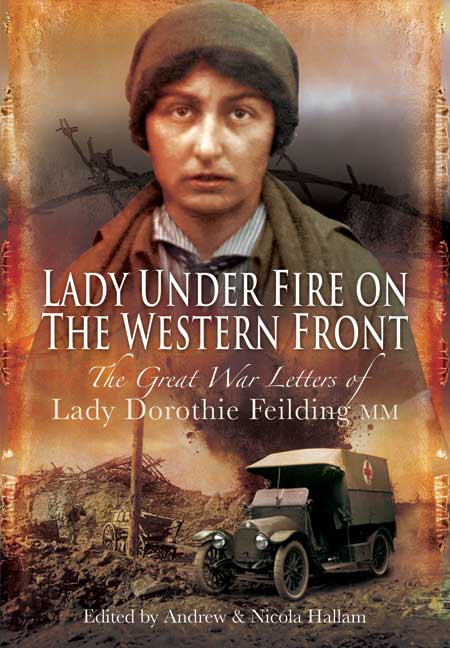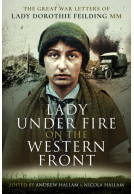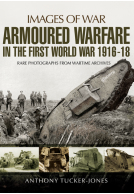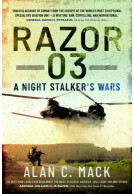Lady Under Fire on the Western Front (ePub)
The Great War Letters of Lady Dorothie Feilding MM
Imprint: Pen & Sword Military
File Size: 4.9 MB (.epub)
Pages: 276
Illustrations: 32 black and white illustrations
ISBN: 9781844682140
Published: 18th October 2010
| Other formats available | Price |
|---|---|
| Lady Under Fire on the Western… Paperback Add to Basket | £14.99 |
When Britain went to war in 1914 many people rallied to the cause, determined to join the colours or be useful in some other way. Lady Dorothie Mary Evelyn Feilding was one of the latter. ‘Lady D’ spent almost three years on the Western Front in Belgium driving ambulances for the Munro Motor Ambulance Corps, an all-volunteer unit. During her time in Flanders her bravery was such that she received the Belgian Order of Leopold, the French Croix de Guerre and was the first woman to be awarded the British Military Medal.
She wrote home to Newnham Paddox, near Rugby, almost daily. Her letters reflect the mundane, tragedy and horror of war and also the tensions of being a woman at the front contending with shells, gossip, funding, lice, vehicle maintenance and inconvenient marriage proposals.
Though Dorothie was the daughter of an Earl and from a privileged upbringing she had an easy attitude that transcended social boundaries and that endeared her to all that she came in to contact with whether royalty or the ordinary fighting man.
This book provides an insight into the reality of the tragedy and horror of the conflict as seen through the eyes of this courageous ambulance driver who was constantly risking her life to save the lives of soldiers, who was presented with the Military Medal by the King himself at Windsor Castle on 6th September 1916.
Newsletter of the Western Front Association - Essex Branch, June 21
The letters are in part translated because sometimes she wrote in a mix of French and English, and I found that fascinating too. When a significant event took place the authors mention it in a paragraph or two after the letter. It offers a better perspective on what happened, but also shows how much work was put into researching the letters. The book is really good and I recommend it. It is a very good primary source for WWI.
Coffee and Books
5/5 stars
Read the full review here
The book will appeal to anyone with an interest in women's work during the Great War, or those who want to know more about the situation in Belgium at the time, but be prepared to set off afterwards on a further journey of your own to learn more about those missing pieces.
The Western Front Association, Sue Light
Read the full review here.
LADY Dorothie Feilding, haggard with exhaustion from service in Flanders, looks at the reader from the cover of this book.
British Army Review/Soldier Magazine - Dr Rodney Atwood
She was a remarkable woman but also one of her generation, volunteering as an ambulance driver in 1914 and awarded the Military Medal, the Croix de Guerre and the Belgian Order of Leopold II for courage and service to the wounded of three nations.
Her letters are well worth reading, full of interest and mostly cheerful. The editors’ comments unfortunately leave many gaps.
These letters, collected and edited by the Hallams are a total joy to read. In the main the editors let Lady Dorothie's voice speak providing just enough linking comment for the reader to be able to put her words in context. Lady Dorothie is a tremendous mixture of jolly hockeysticks and outstanding compassion and bravery. A woman it would have been an honour to know and through her letters, we can get to know her a little. For those interested in the First World War this is a unique viewpoint from an amazing person with a tremendously appealing voice.
Friends of the National Archives
This is not simply the tale of an ambulance driver, it is a view into real courage and humanity. A great book.
The Long, Long Trail
Her letters home tell of the horrors and of life on the front. They are also stirring and full of unashamed patriotism.
Garstang Courier
She enjoyed a ready access to all levels of military life and her candid comments and insightful observations make fascinating reading.
Heritage and History
A useful addition to the relatively small collection of Great War works about those dedicated to easing the lot of the soldier on the Western Front
The Western Front Association Stand To! Magazine
When you think of famous ambulance drivers you would probably imagine Hemingway but there is someone else who shared this duty. Lady Under Fire On The Western Front follows Dorothy Feilding who volunteered for the Munro Motor Ambulance Corps through her own letters and describes everything from her first time driving on the western front to her becoming the first woman to ever receive the Military medal for bravery. With letters dating from August-September 1914 to July-December 1917, the book provides a true insight to not only the life of a woman in the service but the whole first world war and it's effects on the world. Lady Dorothy Feilding may have had a privileged background but it is her answering the call of duty and feisty attitude that endears this book into hearts and keeps the reader hooked until the end.
John (Customer Review)
The lady in question is none other than the daughter of the 9th Earl of Denbigh, who, in 1914, valiantly rallied to the cause when Britain went to war. But not as a nurse, as one perhaps might expect, but as a lady ambulance driver. (Evidenced by her letters she was also one feisty, young lady mechanic).
Susan (Customer Review)
Carefully edited by Andy and Nicola Hallam these are not merely stuffy letters from a privileged young lady - they are positively entertaining!
The comment "everybody out looking for 'bits'!" (after the unfortunate shelling of the 'Grande Place') is a good example of this, as is one photograph of the young, smiling lady modeling her 'gas apparatus' . One entry - 18th January 1917 -includes something perhaps amusing to the point of shocking for 1917, where she speaks of General Booth, Head of The Salvation Army - "He considers I am one (a superfluous woman) & is awfully bucked for me to go to Canada..." (Booth is apparently 'keen on immigration according to Lady Dorothy) "... & ginger up the birth rate."!
Unfortunately, many of these letters also reflect the sheer tragedy and horror of war.
Lady Under Fire on the Western Front is a unique and personal account of letters written by Lady Dorothie Feilding MM to her family living in her hometown Newnham Paddox during World War One as she was a volunteer in Belgium for the Munro Motor Ambulance Corps. These intriguing letters show how an upper class young lady from a titled family mixes in with other women from all walks of life and "class" status as they all unite together to help the injured and hurt soldiers in the famous World War of the early nineteen hundreds. Carefully edited down by history graduates Andrew and Nicola Hallam, this is a must for their collection and is recommended for all.
Kate (Customer Review)
Lady Dorothie Fielding was the daughter of an Earl, yet as a young woman she put the comforts of family life at her ancestral home aside to join in the war effort in 1914. Lady Dorothy joined the Munro Motor Ambulance Corps, and spent the war years undertaking this work on the Western Front. Lady Dorothie demonstrated immense bravery throughout her time driving ambulances under the most terrible circumstances. As a result this remarkable woman was awarded military medals from Britain, France and Belgium for her tremendous efforts.
Paul V (Customer Review)
During her time away from home, Lady Dorothie corresponded with family and friends via letters and telegrams. These letters have been residing in Warwickshire County Record Office in recent years, and were uncovered by the editors of the book, Andrew and Nicola Hallam. The editors have done a superb job of collating, transcribing, and organising Lady Dorothie’s letters. The letters highlight Lady Dorothie’s daily activities and work, carried out amongst the backdrop of war. As the editors themselves indicate, many of the letters were written in pencil and are fading as the years go by. This book opens up the letters for a new audience, and serves as a permanent and accessible record of Lady Dorothie’s fascinating reminiscences. This book is both informative, entertaining; it provides an interesting account of World War One, from the perspective of a woman on the Western Front.
When Britain declared war in August 1914 people from all walks of life flocked to her cause. Both men and women rushed to join the ranks determined to prove their worth for King and Country, and the twenty-five-year-old Dorothie Feilding was no exception. Enlisting into the Munro Motor Ambulance Corps she spent nearly four years on the Western Front becoming the first female recipient of the Military Medal, the Croix de Guerre and the Belgian Order of Leopold.
Paul (Customer Review)
Many soldiers stationed on the Western Front, often wrote home to keep up their spirits, and Dorothie was no exception. Many of her letters to her family home at Newham Palace have been found and carefully edited. They reflect the tragedy of war, as well as driving ambulances, treating with soldiers with horrific wounds, dealing with death on a daily basis, and contending with vehicle maintenance, lice, shells, and the odd marriage proposal. Despite her sheltered upbringing, Dorothie was an easy-going woman with a care-free attitude to life, and she touched the heart of all those she came across.
This delightful book contains hundreds of letters and 40 plates which makes fascinating reading and offers an intriguing insight into life as a woman on the Front Line during the Great War.
True First World War stories from the front-line have become all but commonplace in today's literary market, but it is extraordinary to find a first-hand account of battle from the female perspective. Lady Dorothy Fielding, daughter of the Earl of Denbigh, volunteered as soon as possible for the Munro Motor Ambulance Corps, and spent four grueling years experiencing a zone most women could only read about. This publication provides a reader with a privileged insight into her world in her own words, as Andrew and Nicola Hallam discovered, collated and edited the extensive collection of letters she wrote to her family. A unique female perspective into the Great War is reason enough to read this book, but it is equally extraordinary in its insight into an individual mind at a time which brought great distress, but also bravery and camaraderie. The endearing mixture of a remarkably detailed and vivid image of life as an ambulance driver, and one woman's raw personal feelings never intended for publication, makes this collection of letters read like a novel, gripping you from start to finish and leaving you feeling privileged and humbled to be granted unparalleled access into her world.
Jayne (customer review)
This fascinating book has a staccato, breathless quality, rather reminiscent of modern text speak, which gives it a feeling of immediacy. These letters describing the conditions in which she had to work are a unique source for World War 1 historians. For example, on April 26, 1917 she wrote to her father: "It's a dirty business gas and rather frightening; comes in great foggy waves and makes you cough your head off. Those poor, poor devils of men. I can't tell you what it's like to see them all lying about unconscious and in the most awful state. Much worse than blesses (wounded) in a way because there is so desperately little you can do for them..." This book is thoroughly recommended.
bookshelf
This is a very worthy book, written by a full time a highly regarded author and air historian.
military historical research society
Reflecting on front line life, Dorothie dodges shells and sexist officers,heals the stick and comforts the dying all the while batting off fleas and unwelcome marriage proposals. What a girl! This is crying out for the big silver screen treatment.
Lifestyle Books
In order to bring attention to other readers the author has cast spotlight onto the life of a very resolute and brave young woman.
GUARDS magazine
Readers of this book may find it particularly interesting because Dorothie came from a family of eminent Coldstreamers. Her adventures supported by a fine selection of photos.
Extraordinary letters written by an aristocratic heroine of the First World War have been revealed for the first time in almost a century. Nigel Blundell reads Lady Dorothie Fielding's long-lost correspondence from the front line.
Express
Her letters home tell of the horrors of life on the Western Front, althougthey are also stirring and full of gloriously unashamed jingoism. To Dorothie, our forces were 'Damned fine Tommies' while the German forces were 'bally Huns', 'damned Teutons' or simply 'Fritz'.
Dorothie, writing to her parents and signing herself DoDo or Diddles, was disarmingly upbeat at the start of the conflict. In one letter she told her mother they were short of one driver and asked her to send out the families chauffeur, "Little Smee' because "It would be ripping having him here if he didn't mind being shot at".
However, her spirits wilted subtly as the war progressed and she was gassed, infested with lice, fell seriously ill, saw a close friend killed and lost two of her brothers.
Consequently, some of the most moving of her later letters were lover her fear of loosing her Catholic faith.
Lady Dorothie Feilding, daughter of the ninth Earl of Denbigh, was 24 in 1914. On the outbreak of war she volunteered for the Munro Ambulance Corps, and spent three years under shellfire as an ambulance driver in Belgium, transporting dead and injured from the first line.
Sunday Express
Her letters home tell of the horrors of life on the Western Front although they are also stirring and full of gloriously unashamed jingoism. To Dorothie, our forces were "Damned fine Tommies" while the Germans were ''Bally Huns", "Damned Teutons" or simply "Fritz"
Dorothie's family, whose ancestral home is Newnham Paddox, Warwickshire, lodgedher 400 letters, post cards and telegrams in the county archives of Warwick Record Office, where they were discovered by amateur historians Andrew and Nicola Hallam, who have edited them into a new book 'Lady Under Fire On The Western Front'.
Nicola says "When we came across the old files of Dorothie's letters, our original historical search for local Great War heroes suddenly became a labour of love. We were hooked on her story and over the past 2 years, we really got to know her. We felt almost part of the family.'
When Britain went to war in 1914, Lady Dorothie Feilding wasted no time volunteering for the Munro Motor Ambulance Corps. Spending nearly four years on the Western Front in Belgium driving ambulances, she became the first woman to be awarded the Military Medal for her bravery as well as the French Croix de Guerre and the Belgian Order of Leopold.
Reconnaissance Report
The letters of Lady Dorothie Fielding make for easy and fascinating reading; her candour and humour in describing her experience as a volunteer with the Munro Motor Ambulance Corps from 1914 to 1917 offering a unique perspective on The Great War. Andrew and Nicola Hallam, of course, also deserve credit for the readability of these letters. It is thanks to their efforts in researching, editing and translating (both her lapses into French as well as her affectionate nicknames and euphemisms) Fielding's letters that this collection could be comprised. Fielding's impression of the war at large was of course limited by her gender and role to what she could pick up through general gossip or squeeze from her broad reaching connections. It was these unique circumstances as well as her equally unique personality, however, which makes these accounts so interesting. Fielding's straight forward manner presents a grounded picture of daily life supporting the war effort from the sidelines, and the wit and affection of her letters serve to highlight in contrast the dark times and difficulties she encountered. Her endearing nature also allowed her to overcome many social boundaries, allowing her to access and interact with people at all levels of military life.
T. Kiernan
About Andrew Hallam
About Nicola Hallam















